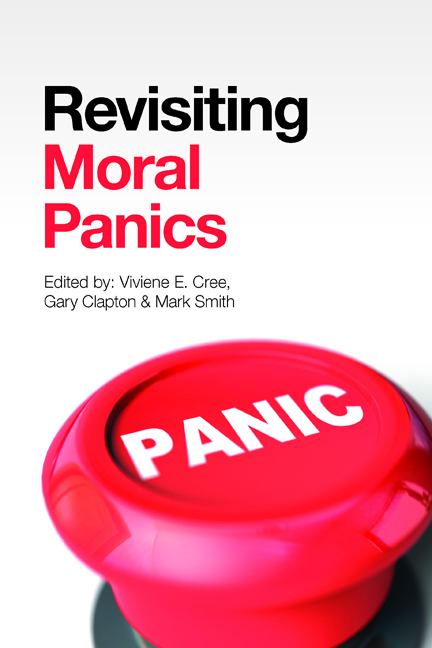Book contents
- Frontmatter
- Contents
- Contributors
- Preface
- Commentary moral panics yesterday, today and tomorrow
- Part One Gender and the family
- Part Two Moral panics in our time? Childhood and youth
- Part Three The state, government and citizens
- Part Four Moral crusades, moral regulation and morality
- Afterword the moral in moral panics
- Conclusion Moral panics and beyond
- Index
Introduction
Published online by Cambridge University Press: 08 March 2022
- Frontmatter
- Contents
- Contributors
- Preface
- Commentary moral panics yesterday, today and tomorrow
- Part One Gender and the family
- Part Two Moral panics in our time? Childhood and youth
- Part Three The state, government and citizens
- Part Four Moral crusades, moral regulation and morality
- Afterword the moral in moral panics
- Conclusion Moral panics and beyond
- Index
Summary
In common with the other parts of this book, a key theorist within the ‘moral panic’ genre is now introduced. Although Geoffrey Pearson does not actually use the term ‘moral panic’ to outline the social reaction to issues and anxieties, his work has played a key part in the development of thinking around the issue of deviance, especially deviance associated with young people, a central theme within moral panic writings. For this reason, we have chosen to include him in this volume.
Geoffrey Pearson
Geoffrey (Geoff) Pearson was born on 26 March 1943 in Manchester, England and studied moral sciences (Philosophy and Psychology) at Cambridge University. He worked with people with disabilities in Sheffield before going to the London School of Economics to undertake training in psychiatric social work (interestingly, Stan Cohen was also a qualified psychiatric social worker). After qualifying, he returned to Sheffield to practise as a psychiatric social worker. Pearson went on to become a Lecturer in Social Work at Sheffield Polytechnic, and then took up a similar position at University College, Cardiff. It was here that he published his first major work, The Deviant Imaginatio (1975), which examined the ideological underpinnings of a wide range of theories of deviance. This book also established Pearson's critical perspective on many of the policies and attitudes towards young people that were popular at that time, especially those that were built on ideas of young people's dangerousness.
In 1976, Pearson moved to the University of Bradford. Here he wrote Hooligan: A History of Respectable Fears (1983), his most influential work; Hooligan was voted one of seven ‘iconic’ studies in British criminology in 2007. In Hooligan, Pearson traces the recurrence of explosions of concern about youth crime (we might call them ‘moral panics’, although he does not). He draws attention to the reality that these explosions of concern are always accompanied by a harpingback to a halcyon time in the past when (supposedly) life was better all round. He argues that there was never a ‘golden age’; instead, there will always be ‘respectable fears’, whether they are centred on the behaviour of hooligans, garrotters, artful dodgers or whoever else is the current focus of fears.
Information
- Type
- Chapter
- Information
- Revisiting Moral Panics , pp. 69 - 72Publisher: Bristol University PressPrint publication year: 2015
